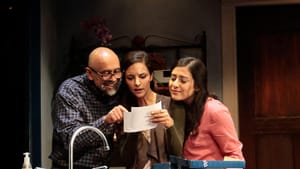Stay in the Loop
BSR publishes on a weekly schedule, with an email newsletter every Wednesday and Thursday morning. There’s no paywall, and subscribing is always free.
Where angels fear to tread
Akhtar’s ‘The Who and the What’ in New York

Welcome to a world where a daughter lives to please her father, and a wife to please her husband.
It’s a world that we assimilated secularists find foreign and unfamiliar. But for today’s Islamic immigrants in America, it’s a harsh reality — that is, according to Ayad Akhtar, an astute playwright, novelist, and screenwriter who’s deeply concerned with issues of identity and assimilation.
Akhtar’s concerns are not new to us. In his explosive 2012 play Disgraced — about upwardly mobile Pakistani immigrants in post-9/11 America — Akhtar distinguished himself as a dramatist with a compelling new voice and the courage to venture where angels fear to tread: straight into the territory of racial and religious prejudice and Islamophobia.
Now, in The Who and the What, Akhtar breaks new controversial ground: contemporary women and Islam in America. In Scene One, we meet two young Pakistani/American sisters — Mawish (a nurse, married to a Muslim) and Zarina (a writer, still single), as they discuss love, marriage, and sex in their father’s home in Atlanta, Georgia. They’re struggling to find their identity in an assimilated world, even while they’re dominated by a traditionalist father.
In Scene Two, we meet Afzal, the father, who has assimilated commercially (he runs a successful car service) yet insists on adhering to the old ways in his personal life. He’s forbidden his daughters to marry out of the faith, and we find him interviewing Eli, a prospective beau for Zarina, whom Afzal has found on the Internet (islamlove.com). Eli is actually a Caucasian/American, a former plumber who has voluntarily converted to Islam and now runs a mosque and a soup kitchen.
Daughter’s challenge
This setup has the makings of an entertaining comedy — and with support from Kimberly Senior’s expertly swift direction, Akhtar teases us into deeper philosophical waters by sustaining the situation’s comedic tension. Eli and Zarina meet — and we learn that Zarina (played by a determined Nadine Malouf), is challenging her faith vigorously, in the form of a novel she’s writing about Mohammed and the source of the tradition of wearing the veil. Nonetheless, the devout convert Eli falls in love with her — rebellious spirit and all — to her father’s delight.
In Act Two, however, Akhtar turns the tables on us (as he did in Disgraced), and the play turns dead serious. Eli has read Zarina’s novel, a daring feminist work that challenges the Koran and contains sexually explicit scenes. He’s torn between his faith on the one hand and his love for his wife and desire to support her on the other. Meanwhile, Afzal, the father, surreptitiously gets hold of the novel and reads it, to his horror. He clashes with Eli, challenging him to “be a man,” “break” his daughter, and “get her under control.”
“In Pakistan, you would be killed!” Afzal cries out to an undaunted Zarina.
Father’s inner conflict
Akhtar deserves credit for his courage in spotlighting the more intimate issues of Islamic women. At the height of the conflict, Zarina’s sister Mawish (played by the beautiful Tala Ashe) dramatically reveals that although she thought she loved her Muslim husband (whom she’s known since childhood), she’s now having an affair with another man. Mawish resents her husband, who pressured her (as a reluctant teenager) into having anal sex for years before their marriage, so that she would technically be a virgin on their wedding night and thus honor her family and Islamic tradition. The rebellious Zarina, meanwhile, remains clear-eyed, resolute, and undeterred throughout.
The surprise — and ultimate strength — of this probing comedy/drama is that it focuses not on the daughters and their sufferings (and there’s plenty of it) but on the inner conflicts of Afzal, the father. As portrayed with dignity and passion by the elegant Sri Lankan actor Bernard White, Afzal struggles desperately, as his faith comes in direct conflict with his deep love for his daughters. Equally compelling is the character of Eli (a sensitive Greg Keller), a gentle, truthful, independent-minded soul who watches this family in crisis, unable to do anything but show love and support for his wife.
Like the playwrights Donald Margulies and John Patrick Shanley, whose small-cast plays also focus on love, marriage, and family (Dinner with Friends and Outside Mullingar respectively), Akhtar displays considerable skill with his tight dramatic structure. He clearly knows and cares about the world whereof he writes.
“I want to give Muslims permission to ask questions,” Zarina says. Credit Akhtar for raising these questions and enlightening us in the process.
What, When, Where
The Who and the What. By Ayad Akhtar; Kimberly Senior directed. Through July 27, 2014 at Claire Tow Theater, Lincoln Center, New York. www.lct.org.
Sign up for our newsletter
All of the week's new articles, all in one place. Sign up for the free weekly BSR newsletters, and don't miss a conversation.